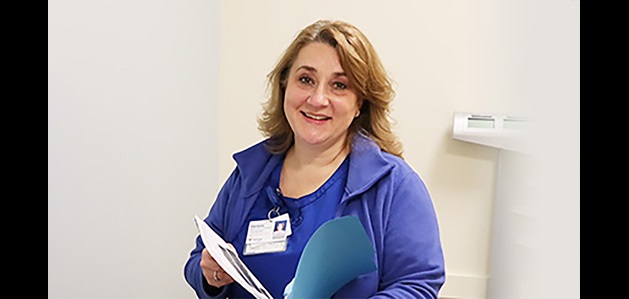Care After COVID Program Helps Nurse Return to Caring for Others
Virtua’s Care After COVID program helped nurse Darlene Alexander return to caring for the community.

Darlene Alexander’s early COVID-19 symptoms were mild. She was able to go for walks, garden, and do pretty much everything she enjoyed. Then nearly two weeks after her positive test in early September 2021, Darlene’s life changed dramatically.
“At Day 12, I got really sick. I was sitting and couldn’t catch my breath. My heart rate was 40 to 42. I’m not an athlete, so it’s not normal for my heart rate to be that low,” said Darlene, a longtime nurse at Virtua Our Lady of Lourdes Hospital. “I knew this was not an urgent care visit. I went to the emergency room.”
Darlene was treated for her symptoms and sent home with appointments to follow up with a cardiologist and pulmonologist. Richard Levine, MD, Darlene’s primary care physician, connected her with Care After COVID, Virtua’s evaluation and recovery program for people dealing with the physical and emotional aftereffects of the coronavirus.
Launched in May 2021, Care After COVID has helped more than 500 people experiencing lingering and new symptoms at least 30 days after becoming sick. The program develops a coordinated plan of care that can include:
- An appointment with a social worker or support group resources to optimize your emotional well-being
- Blood work and other testing
- Referrals to specialists in pulmonology, cardiology, neurology, and more as needed
- Speech therapy and cognitive therapy
- Physical therapy
- Nutritional therapy
Participants typically spend three months in the program.
Recovering from COVID-related pneumonia, shortness of breath, disrupted sleep, and other conditions, Darlene had video visits with Angela Skrzynski, DO, Clinical Lead of the Care After COVID, Urgent Care Telehealth, and Remote Patient Monitoring programs.
“She coordinated everything. She looked years back into my medical history. She got me started on a program of nutrition, sleep hygiene, cognitive exercises—like free yoga sessions on YouTube—and breathing exercises like singing, which really helped my shortness of breath,” said Darlene, 54. “Even though you’re a nurse, this can be very overwhelming.”
“A lot of patients have really significant symptoms. I have had really fit marathon runners who several months out from COVID say they feel better but can’t walk up a flight of stairs without feeling short of breath,” said Dr. Skrzynski. “They can’t exercise, and that turns into weight gain and depression. It really snowballs.”
The worst part, Darlene said, was the “brain fog.” She could not recall what she had just watched on television, and was unable to follow a set of instructions longer than three steps.
“The brain fog was worse than being forgetful. I had really bad cognitive issues,” she said. “I went from being a nurse caring for multiple patients and all of their needs to forgetting to brush my teeth.”
The program set Darlene up with a therapist who helped strengthen her cognitive skills.
“I’m someone who makes lists and would remind people what to do,” she said. “They called and reminded me about appointments and what I needed to do. She set up a calendar I could follow: eat, do my exercises, shower. She coordinated my activities of daily living so I could take care of myself.”
Researchers estimate that one-third of adults with COVID-19 go on to develop a new medical condition. What was once thought to be simply a respiratory illness now has been shown to affect systems throughout the body.
“Almost all of our patients end up requiring cognitive therapy because brain fog is so pervasive,” said Dr. Skrzynski, adding sleep apnea, shortness of breath, mood changes, loss of taste and smell, and fatigue also are common conditions facing people who recovered from COVID. “Many patients report having 10 or more new long-term symptoms since being infected. They are really suffering.”
The fact that COVID may require care from so many types of specialists, coordination is important, said Dr. Levine.
“Navigating the health care system can be challenging even in ideal times. But with COVID and the numerous long-term complications it can cause, making sure you get the best care, from the correct specialists, can be especially daunting,” he said. “The Care After COVID program works to navigate the maze for the patient, coordinating appointments, tests, and treatments, keeping everyone in the loop so we can provide the best care possible.”
“So many patients who join the program tell us that they thought they were going crazy. Based on our experience with hundreds of long-haul COVID patients, we’re able to remind them that they’re not alone, and that the symptoms they’re experiencing are very real,” said Dr. Skrzynski. “We offer them reassurance and our expertise, and they feel supported in their journey to wellness, which is our shared goal.”
While her condition has improved and she returned to work after 4 ½ months, Darlene said she still has a ways to go. She’s thankful for the progress she has made with the Virtua team.
“I feel like I have people I can call, people who will see me. They took me seriously, how I couldn’t remember things,” she said. “Even as I get further along, I can always circle back with them if I need to.”
Get the Care You Need After COVID
Our dedicated team of specialists will help you recover from the physical and emotional aftereffects of COVID-19. Contact a navigator at 856-325-3200 or click here to request an evaluation.
